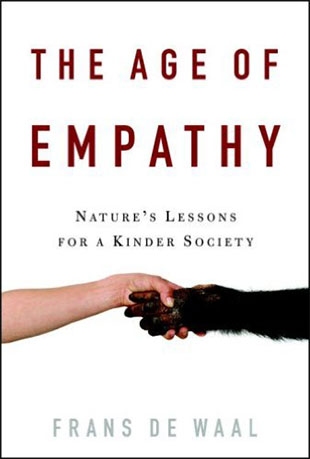Frans de Waal is a Dutch-born biologist who's one of the world's best known primatologists. He is a professor of psychology and director of the Living Links Center at the Yerkes National Primate Research Center at Emory University. In this well-written book filled with anecdotes and stories, de Waal makes the case that human beings are not nasty, brutal creatures looking out only for ourselves but empathetic beings often animated by compassion. Drawing from his own research on animal behavior, he reveals that we are "preprogrammed to reach out." Human empathy has "the backing of a long evolutionary history."
Waal contends that there is a both a social and a selfish side to our species. The emphasis in the United States has been on the latter with the media spewing out stories about greed, political scandal, murders, terrorist attacks, war, and violence. But the evolutionary evidence shows that we are group animals: "highly cooperative, sensitive to injustice, sometimes warmongering, but mostly peace loving." The author reports on acts of empathy by a variety of animals: chimpanzees who take care of wounded mates, elephants who stand over the remains of dead companions, and dolphins who support sick brethren in the water. Bodily connections with others is the genesis of empathy; understanding and moral intelligence follow.
Waal laments that wrong-headed and exaggerated Social Darwinism, the tooth-and-claw view of nature, and the myth of war as a necessary evil, still blind many to the significance of empathy as a virtuous capacity that binds human beings together for the benefit of all. Animal communities are our spiritual teachers in all of this, and it is time we followed in their train in pursuit of peace, justice for all, and cooperative ventures for the good of the planet and all its beings.
